剑桥雅思4口语test1
- 格式:docx
- 大小:15.89 KB
- 文档页数:4
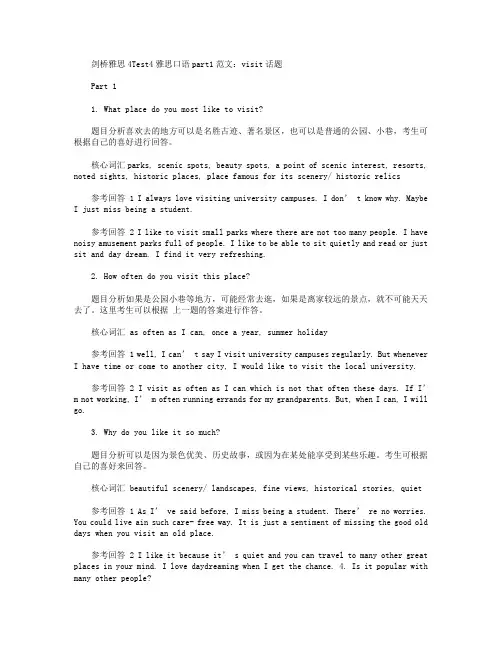
剑桥雅思4Test4雅思口语part1范文:visit话题Part 11. What place do you most like to visit?题目分析喜欢去的地方可以是名胜古迹、著名景区,也可以是普通的公园、小巷,考生可根据自己的喜好进行回答。
核心词汇parks, scenic spots, beauty spots, a point of scenic interest, resorts, noted sights, historic places, place famous for its scenery/ historic relics参考回答 1 I always love visiting university campuses. I don’ t know why. Maybe I just miss being a student.参考回答 2 I like to visit small parks where there are not too many people. I have noisy amusement parks full of people. I like to be able to sit quietly and read or just sit and day dream. I find it very refreshing.2. How often do you visit this place?题目分析如果是公园小巷等地方,可能经常去逛,如果是离家较远的景点,就不可能天天去了。
这里考生可以根据上一题的答案进行作答。
核心词汇 as often as I can, once a year, summer holiday参考回答 1 well, I can’ t say I visit university campuses regularly. But whenever I have time or come to another city, I would like to visit the local university.参考回答 2 I visit as often as I can which is not that often these days. If I’m not working, I’ m often running errands for my grandparents. But, when I can, I will go.3. Why do you like it so much?题目分析可以是因为景色优美、历史故事,或因为在某处能享受到某些乐趣。
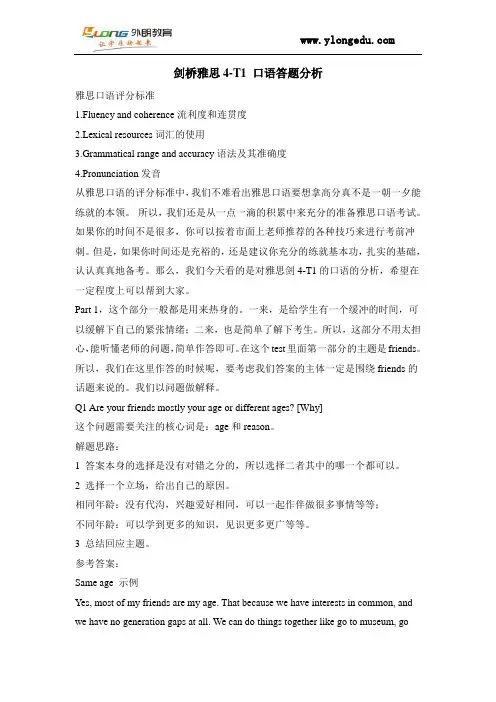
剑桥雅思4-T1 口语答题分析雅思口语评分标准1.Fluency and coherence流利度和连贯度2.Lexical resources词汇的使用3.Grammatical range and accuracy语法及其准确度4.Pronunciation发音从雅思口语的评分标准中,我们不难看出雅思口语要想拿高分真不是一朝一夕能练就的本领。
所以,我们还是从一点一滴的积累中来充分的准备雅思口语考试。
如果你的时间不是很多,你可以按着市面上老师推荐的各种技巧来进行考前冲刺。
但是,如果你时间还是充裕的,还是建议你充分的练就基本功,扎实的基础,认认真真地备考。
那么,我们今天看的是对雅思剑4-T1的口语的分析,希望在一定程度上可以帮到大家。
Part 1,这个部分一般都是用来热身的。
一来,是给学生有一个缓冲的时间,可以缓解下自己的紧张情绪;二来,也是简单了解下考生。
所以,这部分不用太担心,能听懂老师的问题,简单作答即可。
在这个test里面第一部分的主题是friends。
所以,我们在这里作答的时候呢,要考虑我们答案的主体一定是围绕friends的话题来说的。
我们以问题做解释。
Q1 Are your friends mostly your age or different ages? [Why]这个问题需要关注的核心词是:age和reason。
解题思路:1 答案本身的选择是没有对错之分的,所以选择二者其中的哪一个都可以。
2 选择一个立场,给出自己的原因。
相同年龄:没有代沟,兴趣爱好相同,可以一起作伴做很多事情等等;不同年龄:可以学到更多的知识,见识更多更广等等。
3 总结回应主题。
参考答案:Same age 示例Yes, most of my friends are my age. That because we have interests in common, and we have no generation gaps at all. We can do things together like go to museum, goshopping, and visit some scenic spot. We can freely talk about things we both interested in, whilst people who are different ages tend to have different hobbies and interests. Therefore, I would like to make friends who are at my age.Different age 示例No, my friends almost are different ages with me. The reason is I enjoy diversities. People who are at different age have various life experience and different life experience bring ones diverse point of views. I prefer talk with different age friends about value of life, which bring me a lot of fun. That the reason why my friends are almost different ages.Part 2 部分,这个比部分因为留有预备的时间,所以难度较Part 3 还是容易些的。
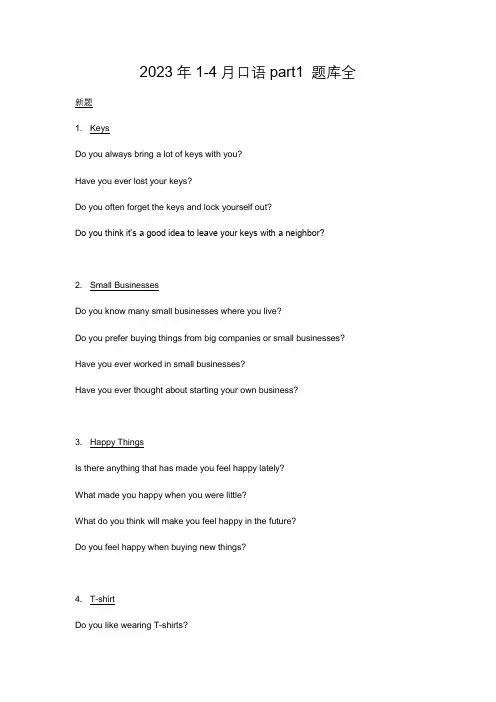
2023年1-4月口语part1 题库全新题1. KeysDo you always bring a lot of keys with you?Have you ever lost your keys?Do you often forget the keys and lock yourself out?D o you think it’s a good idea to leave your keys with a neighbor?2. Small BusinessesDo you know many small businesses where you live?Do you prefer buying things from big companies or small businesses? Have you ever worked in small businesses?Have you ever thought about starting your own business?3. Happy ThingsIs there anything that has made you feel happy lately?What made you happy when you were little?What do you think will make you feel happy in the future?Do you feel happy when buying new things?4. T-shirtDo you like wearing T-shirts?How often do you wear T-shirts?Do you like T-shirts with pictures or prints?Do you think older people who wear T-shirts are fashionable? Outer SpaceHave you ever learn about outer space and stars?Do you want to know more about outer space?Do you like science fiction movies?Do you want to go into outer space in the future?5. ArtDo you like art?Do you like visiting art galleries?Do you want to be an artist?Do you like modern art or traditional art?6. WeekendsDo you like weekends?What do you usually do on weekends?What did you do last weekend?Do you make plans for your weekends?7. JewelryDo you often wear jewelry?What type of jewelry do you like?Do you usually buy jewelry?Why do you think some people wear a piece of jewelry for a long time?8. ChocolateDo you like eating chocolate?Did you often eat chocolate when you were a kid?Why do you think chocolate is popular around the world?Do you think it is good to use chocolate as gifts to others?9. MusicWhat music do you like?What music do you dislike?Do you friends enjoy the same types of music as you do?Which singer or musician would you like to see in person?10. Staying upDo you often stay up late?Did you stay up late when you were a kid?What do you do when you stay up late?What does it feel like the next morning if you stay up late?11. LibraryDo you often go to the library?What do you usually do in the library?Did you go to the library when you were a kid?Do Chinese kids often go to the library?12. SchoolsWhere do you go to school?Do you go to a good school?Do you like your teachers?Do you like your current learning atmosphere?13. SportsWhat sports do you like?Where did you learn how to do it?Did you do some sports when you were young?Do you think students need more exercise?旧题14. MorningDo you like getting up early in the morning?What do you usually do in the morning?What did you do in the morning when you were little?Are there any differences between what you do in the morning now and what you did in the past?15. TechnologyWhat technology do you often use, computers or cellphones?What electronic devices have you bought lately?Is there any technology you want to buy?Is technology important in your life?16. Public TransportationWhat kind of public transportation do you usually take?When do you usually take public transportation, in your everyday life or when you are traveling?Do most people prefer public transportation in your country?Did you take public transportation when you were a kid?17. WeatherW hat’s the weather like where you live?Do you prefer cold or hot weather?Do you prefer dry or wet weather?Are you in the habit of checking the weather forecast?18. NamesDoes your name have any special meanings?How would you choose names for your next generation?Does anyone in your family have the same name as you?Are there any differences between how Chinese name their children now and in the past?19. SnacksWhat snacks do you like to eat?Did you often eat snacks when you were young?Do you think it is healthy for you to eat snacks?When do you usually eat snacks now?20. GeographyDo you like geography?Have you ever studied geography at school?Are you good at reading a map?Would you visit a country because of its geographical location?21. Social MediaDo you or your friends like using social media?Do you think you or your friends use too much social media? Do you want to work in social media?What’s the most popular social media in China?22. PuzzlesDid you do puzzles in your childhood?When do you do puzzles, during a trip or when you feel bored? Do you like doing word puzzles or number puzzles?Do you think it is good for old people to do puzzles?23. CookingDo you do some cooking at home now?Did you do some house cleaning when you were young?Do you have breakfast at home every day?Do you want to learn how to cook well?24. BirthdayWhat do you usually do on your birthday?What did you do on your birthday when you were young?Do you think it is important for you to celebrate your birthday?Whose birthday do you think is the most important to celebrate in China?25. WritingDo you write a lot?What do you like to write?Do you think the things you write would change?Do you prefer typing or handwriting when you are writing?26. SingingDo you like singing?Have you ever learnt how to sing?Who do you want to sing for?Do you think singing can bring happiness to people?27. HometownWhere is your hometown?Is that a big city or a small place?Is there anything you dislike about your hometown?Do you think you will continue living there for a long time?28. AccommodationDo you live in a house or a flat?How long have you lived there?What do you usually do in your house/ flat?What can you see from the window of your flat?29. Your AreaDo you like the area where you live?Where do you like to go in your area?Do you know any famous people in your area?Has your area changed recently?30. Study or Work(Study)Are you a student or do you work?What is your major?Are you looking forward to working?Do you prefer to study in the mornings or in the afternoons? (Work)Are you a student or do you work?Do you like your job?Why did you choose to do that type of work? Do you miss being a student?。
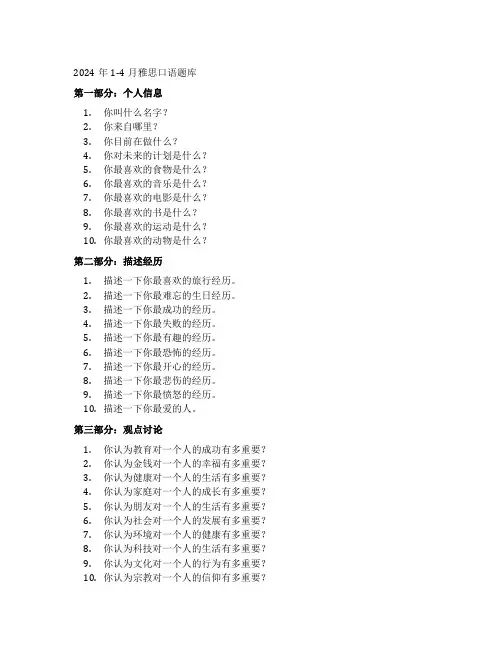
2024年1-4月雅思口语题库第一部分:个人信息1.你叫什么名字?2.你来自哪里?3.你目前在做什么?4.你对未来的计划是什么?5.你最喜欢的食物是什么?6.你最喜欢的音乐是什么?7.你最喜欢的电影是什么?8.你最喜欢的书是什么?9.你最喜欢的运动是什么?10.你最喜欢的动物是什么?第二部分:描述经历1.描述一下你最喜欢的旅行经历。
2.描述一下你最难忘的生日经历。
3.描述一下你最成功的经历。
4.描述一下你最失败的经历。
5.描述一下你最有趣的经历。
6.描述一下你最恐怖的经历。
7.描述一下你最开心的经历。
8.描述一下你最悲伤的经历。
9.描述一下你最愤怒的经历。
10.描述一下你最爱的人。
第三部分:观点讨论1.你认为教育对一个人的成功有多重要?2.你认为金钱对一个人的幸福有多重要?3.你认为健康对一个人的生活有多重要?4.你认为家庭对一个人的成长有多重要?5.你认为朋友对一个人的生活有多重要?6.你认为社会对一个人的发展有多重要?7.你认为环境对一个人的健康有多重要?8.你认为科技对一个人的生活有多重要?9.你认为文化对一个人的行为有多重要?10.你认为宗教对一个人的信仰有多重要?第四部分:解决问题1.你如何解决一个与朋友之间的冲突?2.你如何解决一个与家人之间的冲突?3.你如何解决一个与同事之间的冲突?4.你如何解决一个与陌生人之间的冲突?5.你如何解决一个与上司之间的冲突?6.你如何解决一个与下属之间的冲突?7.你如何解决一个与顾客之间的冲突?8.你如何解决一个与供应商之间的冲突?9.你如何解决一个与竞争对手之间的冲突?10.你如何解决一个与政府之间的冲突?第五部分:综合1.你如何看待中国的经济发展?2.你如何看待中国的社会发展?3.你如何看待中国的文化发展?4.你如何看待中国的科技发展?5.你如何看待中国的教育发展?6.你如何看待中国的医疗发展?7.你如何看待中国的环境发展?8.你如何看待中国的军事发展?9.你如何看待中国的对外关系?10.你如何看待中国的未来发展?上述题库仅供参考,实际考试中可能出现不同的题目。
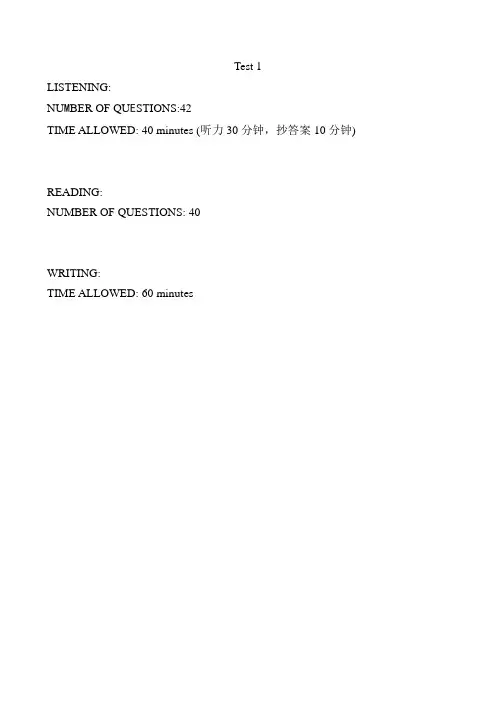
Test 1LISTENING:NU M BER OF QU E STIONS:42TIME ALLOWED: 40 minutes (听力30分钟,抄答案10分钟)READING:NUMBER OF QUESTIONS: 40WRITING:TIME ALLOWED: 60 minutesTEST 1LISTENINGSECTION 1Questions 1-10Questions 1-4Complete the notes below.Write NO MORE THAN THREE WORDS AND/OR A NUMBER for each answer.Questions 5-10Complete the table below.Write NO MORE THAN THREE WORDS AND/OR A NUMBER for each answer.SECTION 2 Questions 11—20Questions 11-13Complete the sentence below.Write NO MORE THAN THREE WORDS AND/OR A NUMBER for each answer.RIVERSIDE INDUSTRIAL VILLAGE11Riverside Village was a good place to start an industry because it had wate, raw materials and fuels such as …………………a nd……………………. .12The metal industry was established at Riverside Village by ……………… who lived in the area.13There were over ……………water-powered mills in the area in the eighteenth century.Questions 14-20Label the plan below.Write NO MORE THAN THREE WORDS for each answer.14………RoadSECTION 3 Questions 21-30Questions 21 and 22Choose the correct letter, A,B or C.21Melanie says she has not started the assignment becauseA she was doing work for another course.B it was s really big assignment.C she hasn’t spent time in the library.22 The lecture says that reasonable excuses for extensions areA planning problems.B problems with assignment.C personal illness or accident.What recommendation does Dr Johnson make about the journal articles ?Choose your answers for the box and write the letters A – G next to questions 23-27.Jackson: 23 ……………………..Roberts: 24 ……………………..Morris: 25 ……………………..Cooper: 26 ……………………..Forster: 27 ……………………..Label the chart below.Choose your answer from the box below and write the letters A – H next to questions 28-30.Population studiesReasons for changing accommodation7060502010SECTION 4 Question 31—40Complete the notes belowWrite NO MORE THSN TWO WORDS for each answer.READINGREADING PASSAGE 1You should spend about 20 minutes on Questions 1-14 which are based on reading passage 1 below.Adults and children are frequently confronted with statements about the alarming rat of loss of tropical rainforests. For example, one graphic illustration to which children might readily relate is the estimate that rainforests are being destroyed at a rate equivalent to one thousand football fields every forty minutes – about the duration of a normal classroom period. In the face of the frequent and often vivid media coverage, it is likely that children will have formed ideas about rainforests – what and where they are, why they are important, what endangers them – independent of any formal tuition. It is also possible that some of these ideas will be mistaken.Many studies have shown that children harbour misconceptions about ‘pure’, curriculum science. These misconceptions do not remain isolated but become incorporated into a multifaceted, but organized, conceptual framework, making it and the component ideas, some of which are erroneous, more robust but also accessible to modification. These ideas may be developed by children absorbing ideas through the popular media. Sometimes this information may be erroneous. It seems schools may not be providing an opportunity for children to re-express their ideas and so have them tested and refined by teachers and their peers.Despite the extensive coverage in the popular media of the destruction of rainforests, little formal information is available about children’s ideas in this area, the aim of the present study is to start to provide such information, to help teachers design their educational strategies to build upon correct ideas and to displace misconceptions and to plan programmes in environmental studies in their schools. The study surveys children’s scientific knowledge and attitudes to rainforests. Secondary school children were asked to complete a questionnaire containing fiveopen-form questions. The most frequent responses to the first question were descriptions which are self-evident from the term ‘rainforest’. Some children described them as damp, wet or hot. The second question concerned the geographical location of rainforests. The commonest responses were continents or countries: Africa (given by 43% of children), south America (30%), Brazil (25%). Some children also gave more general locations, such as being near the Equator.Responses to question three concerned the importance of rainforests. The dominant idea, raised by 64% of the pupils, was that rainforests provide animals with habitats. Fewer students responded that rainforests provide plant habitats, and even fewer (60%) raised the idea of rainforest as animal habitats.Similarly, but at a lower level, more girls (13%) than boys (5%) said that rainforests provided human habitats. These observations are generally consistent with our previous studied of pupils’ views about the use and conservation of rainforests, in which girls were shown to be more sympathetic to animals and expressed views which seem to place an intrinsic value on non-human animal life.The fourth question concerned the causes of the destruction of rainforests. Perhaps encouragingly, more than half of the pupil (59%) identified that it is human activities which are destroying rainforests, some personalising the responsibility by the use of terms such as ‘we are’. About 18% of the pupils referred specifically to logging activiy.One misconception, expressed by some 1)% of the pupils, was that acid rain is responsible for rainforest destruction; a similar proportion said that pollution is destroying rainforests. Here, children are confusing rainforest destruction with damage to the forests of Western Europe by these factors. While two fifths of the students provided the information that the rainforests provide oxygen, in some cases this response also embraced the misconception that rainforest destruction would reduce atmospheric oxygen, making the atmosphere incompatible with human life on Earth.In answer to the final question about the importance of rainforest conservation, themajority of children simply said that we need rainforests to survive. Only a few of the pupils (6%) mentioned that rainforest destruction may contribute to global warming. This is surprising considering the high level of media coverage on this issue. Some children expressed the idea that the conservation of rainforests is not important.The results of this study suggest that certain ideas predominate in the thinking of children about rainforests. Pupils’responses indicate some misconceptions in basic scientific knowledge of rainforests’ ecosystems such as their ideas about rainforests as habitats for animals, plants and humans and the relationship between climatic change and destruction of rainforests.Pupils did not volunteer ideas that suggested that they appreciated the complexity of causes of rainforest destruction. In other words, they gave no indication of an appreciation of either the rage of ways in which rainforests are important or the complex social, economic and political factors which drive the activities which are destroying the rainforests. One encouragements is that the results of similar studies about other environmental issues suggest that older children seem to acquire the ability to appreciate, value and evaluate conflicting views. Environmental education offers an arena in which these sills can be developed, which is essential fore these children as future decision –makers.Question 1-8Do the following statements agree with the information given in reading passage 1? In boxes 1-8 on your answer sheet writeTRUE if the statement agrees with the informationFALSE if the statement contradicts the informationNOT GIVEN if there is no information on this。

剑桥4test1大作文小红书The information given by the line chart is about electricity demand in England in a typical winter and summer day.The pie chart compares how the electricity is use din an ordinary English household.According to the two-line chart,the demand for electricity in winter is constantly higher than that in summer.Precisely,the demand drops from 40,000 units at 3.00 to the bottom at 20,000 units at 8.00 before it soars to the highest point at 45,000 unit sat about 22.00.It is followed by a sharp increase to nearly 35,000 units at 24.00.In contrast,the time period between 0.00 and 9.00 witnesses a gentle decrease in the demand for electricity in summer,which is followed by a rise to the peak at 20,000units,25,000 units less than that in winter.As for the pie chart,the purpose of electricity use involves four parts.Heatingrooms and water occupies the largest percentage (52.5%).Thesecond largest component is ovens,kettles and washing machines which is 35%lower than the former one.It is followed by lighting,TV,radio and vacuum cleaners,food mixers,electric tools which represents 15%respectively.Overall,there is an apparent difference in the demand for electricity in winter and summer.The electricity distribution for different purpose is also various.。
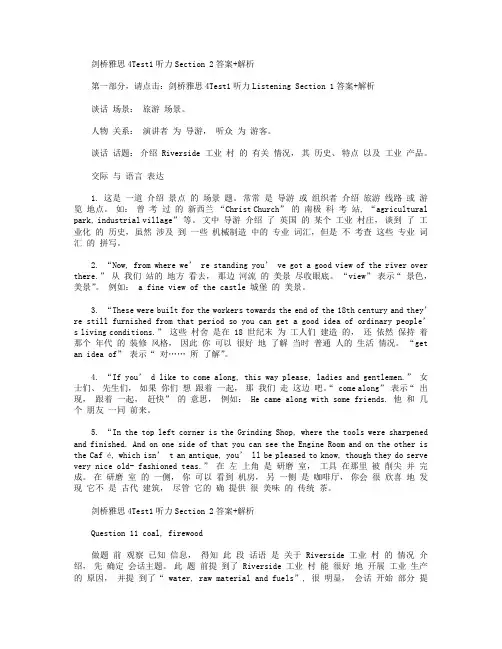
剑桥雅思4Test1听力Section 2答案+解析第一部分,请点击:剑桥雅思4Test1听力Listening Section 1答案+解析谈话场景:旅游场景。
人物关系:演讲者为导游,听众为游客。
谈话话题:介绍 Riverside 工业村的有关情况,其历史、特点以及工业产品。
交际与语言表达1. 这是一道介绍景点的场景题。
常常是导游或组织者介绍旅游线路或游览地点。
如:曾考过的新西兰“Christ Church”的南极科考站, “agricultural park, industrial village”等。
文中导游介绍了英国的某个工业村庄,谈到了工业化的历史,虽然涉及到一些机械制造中的专业词汇,但是不考查这些专业词汇的拼写。
2. “Now, from where we’ re standing you’ ve got a good view of the river over there.”从我们站的地方看去,那边河流的美景尽收眼底。
“view”表示“景色,美景”。
例如: a fine view of the castle 城堡的美景。
3. “These were built for the workers towards the end of the 18th century and they’re still furnished from that period so you can get a good idea of ordinary people’s living conditions.”这些村舍是在 18 世纪末为工人们建造的,还依然保持着那个年代的装修风格,因此你可以很好地了解当时普通人的生活情况。
“get an idea of”表示“对……所了解”。
4. “If you’ d like to come along, this way please, ladies and gentlemen.”女士们、先生们,如果你们想跟着一起,那我们走这边吧。
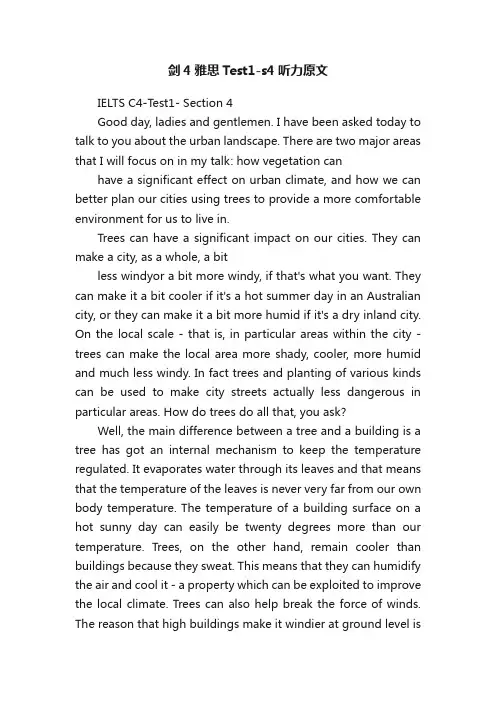
剑4雅思Test1-s4听力原文IELTS C4-T est1- Section 4Good day, ladies and gentlemen. I have been asked today to talk to you about the urban landscape. There are two major areas that I will focus on in my talk: how vegetation canhave a significant effect on urban climate, and how we can better plan our cities using trees to provide a more comfortable environment for us to live in.Trees can have a significant impact on our cities. They can make a city, as a whole, a bitless windyor a bit more windy, if that's what you want. They can make it a bit cooler if it's a hot summer day in an Australian city, or they can make it a bit more humid if it's a dry inland city. On the local scale - that is, in particular areas within the city - trees can make the local area more shady, cooler, more humid and much less windy. In fact trees and planting of various kinds can be used to make city streets actually less dangerous in particular areas. How do trees do all that, you ask?Well, the main difference between a tree and a building is a tree has got an internal mechanism to keep the temperature regulated. It evaporates water through its leaves and that means that the temperature of the leaves is never very far from our own body temperature. The temperature of a building surface on a hot sunny day can easily be twenty degrees more than our temperature. Trees, on the other hand, remain cooler than buildings because they sweat. This means that they can humidify the air and cool it - a property which can be exploited to improve the local climate. Trees can also help break the force of winds. The reason that high buildings make it windier at ground level isthat, as the wind goes higher and higher, it goes faster and faster. When the wind hits the building, it has to go somewhere. Some of it goes over the top and some goes around the sides of the building, forcing those high level winds down to ground level.That doesn't happen when you have trees. Trees filter the wind and considerably reduce it, preventing those very large strong gusts that you so often find around tall buildings.Another problem in built-up areas is that traffic noise is intensified by tall buildings. By planting a belt of trees at the side of the road, you can make things a little quieter, but much of the vehicle noise still goes through the trees. Trees can also help reduce the amount of noise in the surroundings, although the effect is not as large as people like to think. Low-frequency noise, in particular, just goes through the trees as though they aren't there.Although trees can significantly improve the local climate, they do however take up a lot of space. There are root systems to consider and branches blocking windows and so on. It may therefore be difficult to fit trees into the local landscape. There is not a great deal you can do if you have what we call a street canyon - a whole set of high-rises enclosed in a narrow street. Trees need water to grow. They also need some sunlight to grow and you need room to put them. If you have the chance of knocking buildings down and replacing them, then suddenly you can start looking at different ways to design the streets and to introduce .. .(fade out)。
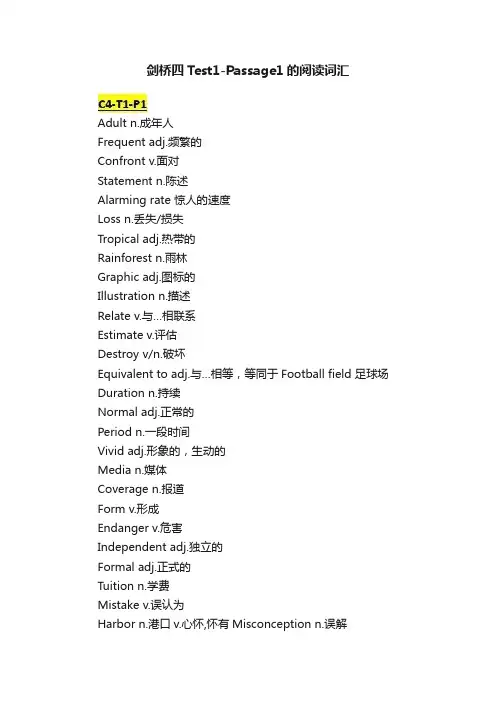
剑桥四Test1-Passage1的阅读词汇Adult n.成年人Frequent adj.频繁的Confront v.面对Statement n.陈述Alarming rate 惊人的速度Loss n.丢失/损失Tropical adj.热带的Rainforest n.雨林Graphic adj.图标的Illustration n.描述Relate v.与…相联系Estimate v.评估Destroy v/n.破坏Equivalent to adj.与…相等,等同于Football field 足球场Duration n.持续Normal adj.正常的Period n.一段时间Vivid adj.形象的,生动的Media n.媒体Coverage n.报道Form v.形成Endanger v.危害Independent adj.独立的Formal adj.正式的Tuition n.学费Mistake v.误认为Harbor n.港口v.心怀,怀有Misconception n.误解Pure adj.纯洁的Curriculum n.课程Science n.科学Remain v.保持Isolate v.孤立Incorporate into/integrate into v.融入,结合Multifaceted adj.多方面的,多才多艺的Organized adj.有组织的Conceptual adj.概念上的Framework n.框架Component adj.构成的,组成的n.组成部分Erroneous adj.有错误的Robust adj.富有活力的,强壮的Accessible to adj.可接触到的Modification n.修改Absorb v.吸收Absorption n.Re-express v.重新阐述Test v.测试n.Refine v.精炼,提炼;使变得完善Despite prep.不管, 尽管Extensive adj.广泛的Intensive adj.加强的,密集的Destruction n.破坏Formal adj.正式的informal adj.非正式的Available adj.可提供的Aim/target/goal n.目标Present adj.现在的n.礼物Design v.设计Strategy n.策略,方法Build upon v.建立Correct/accurate adj.正确的,准确的Displace vt.替换, 取代Plan v.计划n.Survey n.研究Scientific adj.科学的Knowledge n.知识attitude n.态度Secondary school n.中学Complete v.完成completion n. Compete v.竞争competition n. Questionnaire n.问卷调查Contain n.包含Open-form question 开放式问题Response n.回答,回复respond v. Describe v.描述description n.Self-evident adj.显而易见的,明显的T erm n.专业术语Damp/humid adj.潮湿的humidity n. Concerning prep. (表示论及)关于, 有关, Concern v.有关于, 关系到;使担忧, 使烦恼Geographical location n.地理位置Common adj.普遍的Continent adj.大陆Africa n.非洲African adj./n.Brazil 巴西South America 南美General adj. 普遍的,一般的Equator n.赤道Dominant adj. 主要的Raise v.抚养,饲养;提出(propose)Pupil n.小学生Provide/offer v.提供Habitat n.栖息地Plant n.植物Mention v./n.提到Indigenous/native adj.本地的,当地的Population n.人口Similarly adv.相似地,类似地similar adj. At a lower level在低的水平Observation n.观察observe v。
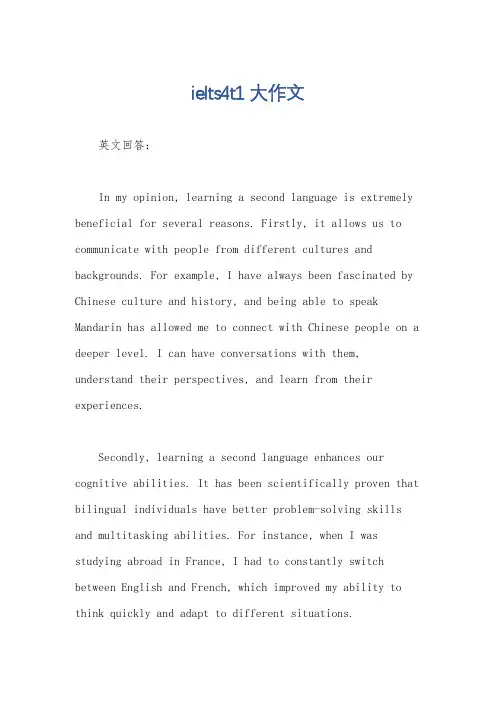
ielts4t1大作文英文回答:In my opinion, learning a second language is extremely beneficial for several reasons. Firstly, it allows us to communicate with people from different cultures and backgrounds. For example, I have always been fascinated by Chinese culture and history, and being able to speak Mandarin has allowed me to connect with Chinese people on a deeper level. I can have conversations with them, understand their perspectives, and learn from their experiences.Secondly, learning a second language enhances our cognitive abilities. It has been scientifically proven that bilingual individuals have better problem-solving skills and multitasking abilities. For instance, when I was studying abroad in France, I had to constantly switch between English and French, which improved my ability to think quickly and adapt to different situations.Furthermore, learning a second language opens up more career opportunities. In today's globalized world, companies are looking for employees who can communicate effectively with international clients and partners. For instance, my friend who is fluent in Spanish was able to secure a job in a multinational company that has a strong presence in Latin America. His language skills gave him a competitive edge over other candidates.Additionally, learning a second language can also improve our first language skills. When we learn a new language, we become more aware of the grammar, vocabulary, and pronunciation of our native language. It helps us to express ourselves more accurately and effectively. For example, after learning French, I noticed that my English writing became more precise and my vocabulary expanded.中文回答:在我看来,学习第二语言有着极大的好处。
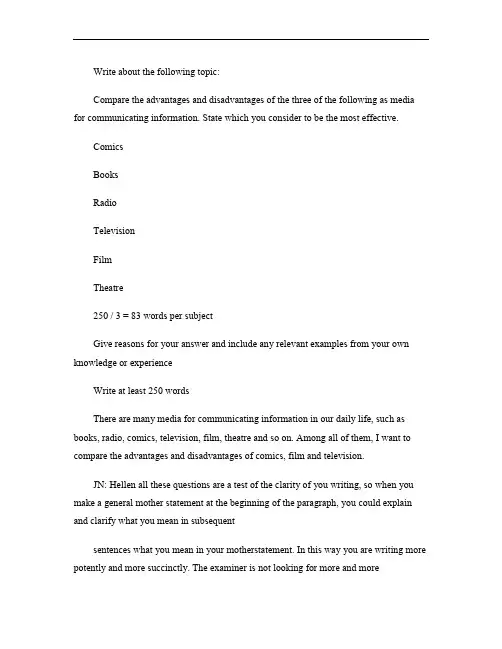
Write about the following topic:Compare the advantages and disadvantages of the three of the following as media for communicating information. State which you consider to be the most effective.ComicsBooksRadioTelevisionFilmTheatre250 / 3 = 83 words per subjectGive reasons for your answer and include any relevant examples from your own knowledge or experienceWrite at least 250 wordsThere are many media for communicating information in our daily life, such as books, radio, comics, television, film, theatre and so on. Among all of them, I want to compare the advantages and disadvantages of comics, film and television.JN: Hellen all these questions are a test of the clarity of you writing, so when you make a general mother statement at the beginning of the paragraph, you could explain and clarify what you mean in subsequentsentences what you mean in your motherstatement. In this way you are writing more potently and more succinctly. The examiner is not looking for more and moreinformation, but at how you clearly and simply you present your argument so that all can understand. This is the art of communication princess!As we all could see, when we read comics, we could relax ourselves and get a lot of fun from the comics. Meanwhile, we could learn a lot from it as well., Comics For example One Piece, it tells us once we have a dream. We must make great efforts to make it come into reality. No matter how difficult it becomes, never say die. One Piece conveys the message that; once we make commitment to our friends, we should commit to them to the end.However, some students are (JN; become too obsessed with comics, they read comics in class, after class, even when they return home, and they don ’ t want to have dinner. (JN:They just stay in their bedroom reading. It (JN: This is not only bad for their health, but also they neglect their studiesCompare with film, we haven’ t had such kind of problems when we watch a film (JN: yes we do still have the above problems hellen, some young kids stay in their room watching X rated pornographic film on computer porno sites. For example When we are tired from work or study, we find some comedy (films such as Tais-toi to relax ourselves, for example Tais-toi . When we begin to complaint about the life, we could watch The Terminal. When we want to give up, we could watch The Shaw Shank Redemption.However, they do (Some films have extremely vulgar contentsome vulgar films that have a really bad influence, especially for children. In this way, (it is really helpful and less worries when we watch television. But the biggest problem is that we can’t take the television with us. When we (want to watch (TV it, we have to be in a given fixed place that there is a television.Above all, in our daily life, we can’ t use one me dia for communicating information. All the media above, they are all indispensable, and they complement to each other. Asthe development of science and technology, they whole society has been making great progress.So we have to make full use of all the media to make our life more and more rich colorful.。
C4 Test 1SpeakingPart 1Family1.Q: Do you have a large family or a small family?A: Well, I have a small family, for there are only three people in it --- my parents and myself.2.Q: Can you tell me something about them?A: Certainly. My father works at an international company as a sales manager foralready 8 years. I think he’s been working hard for his career as well as for our family.My mother has the occupation of a doctor in a local hospital. She specializes herself in brain surgeries. I assume she qu ite likes her job, though it’s sometimes a tough one to handle, she thinks. Both my parents love me a lot. They show very much concern to my life and study. More importantly, they’ve been role models for my life during all these years of my growing up.3.Q: How much time do you manage to spend with members of your family?A: Actually, I usually manage to spend around 5 hours with them. As I mentioned above, both of my parents work busily for their jobs. I, as a student in college, have toaccomplish a daily school schedule. So, the only time we can manage to spend together is when we all finish our work and go back home.4.Q: What sort of things do you like to do together?A: The things we like to do together could be various. We have dinner together, during whi ch time we talk about one another’s daytime events. Sometimes, we watchtelevision programs after it. We do have a favourite one --- a talk show on Channel 4 every Tuesday evening. We choose to go out for a walk, too, sometimes. We might also participate in activities held in our community centre. They are usually fun and relaxing and offering us opportunities to get to know people living in the same neighbourhood with us.5.Q: Did/Do you get on well with your family?A: I guess I’m able to say so. You see, i n my family, everyone communicates with others on a regular basis to make sure there’re no misunderstandings ever between us. We treat it as a healthy way to let our thoughts and emotions be revealed to others and discuss about them openly. For that reason, I don’t think we have what people call“generation gap” in the family.Part 2You will have to talk about the topic for one or two minutes.You have one minute to think about what you are going to say.You can make some notes to help you if you wish.Model answer:I would like to talk about one of my senior high school teachers. He taught memathematics in my second and third grades. His way of teaching was special compared with that of the other teachers. Instead of lecturing about many tedious and abstract concepts and displaying lots of formulas. During his lecture, he never forgot to show his great sense of humour to add to the activeness of the class. What was most impressive about him anddisadvantages of them and making us select the best presented solution on our own initiative. He opened our mind to new ideas and cultivated us to be capable of analyzing the pros and cons of a resolution in order to make the best decision. This capability to a great extent influenced me in the ways of making judgements in my work as well as in my life.Part 3Developments in education1.Q: How has education changed in your country in the last 10 years?A: As a matter of fact, I did see a big bounce in the development of China’s educationsystem in the last decade. It’s hard to believe that ten years ago education was nobetter than the dull implementation of the old-fashioned teacher-centre approachwhich could hardly succeed in motivating students. The only advantage students gotseemed to be the mere skills gained from painfully repetitive exercises that could help them pass the exams. In opposition to it, the education we have now emphasizes onwhat people call Quality Teaching which aims to cultivate the initiative and creativity of students, helping them know how to learn, not just what to learn. Only in this way can they turn out to be persons with the capability of independent thinking. This is beyond doubt a big and bold step in the reform of teaching methodology in the education in my country.2.Q: What changes do you foresee in the next 50 years?A: In the 50 years that follow, I’m confident we can see quite a few changes taking place in this area. The most significant transformation in education would be a switch frombeing examination-oriented to being capability-oriented, thanks once again to thecontinuing implementation of Quality Teaching. The next possible change will occur inthe teaching approach concerning the growing utilization of computers. Teaching willlikely be conducted via the Internet to make remote education more applicable. Lastly, I predict a big possibility of bilingual teaching in the future. As is a trend to use English as an international language, schools shall be required to employ it as a second teachinglanguage.A national education system3.Q: How do the expectations of today’s school leavers compare with those of theprevious generation?A: Compared with the former generation, present-day school graduates absolutely hold higher expectations for their future. They are no longer satisfied with a Bachelor’sdegree which was clearly still a dream to pursue for many of the previous generation.School leavers now hope to acquire further education opportunities both home andabroad which in return could turn them into Masters and even Doctors. The desire to be equipped with more knowledge and skills comes from the pressure exerted by theincreasing career competition and the improvement of people’s average academic level.4.Q: What role do you think extracurricular activities play in education?A: Extracurricular activities undoubtedly have their advantages for students in theirstudy. They help balance students’ life and study, offering them a way to release theirstress or any negative feeling in a healthy way. Besides, some activities with physicalexercise involved could also enable them to better maintain their health, guaranteeingthe successful fulfillment of their intense academic schedule.Different styles / methods of teaching and learning5.Q: What method of learning works best for you?A: Well, umm… It’s really hard to say …, nevertheless, I do find the method of learningfrom practice works a great deal for me. Knowledge and information from textbooks are systematic and comprehensive, yet are usually unable to make me have a lastingmemory and a thorough appliance of them. Learning from practice, I will be able toexperience the whole process by myself. Practice of independent thinking, analyzingcauses, comparing results and concluding from the facts will all be included in it. Withexperience gained, I will have my own insight of the knowledge, hence a deep memoryof it.6.Q: How beneficial do you think it is to group students according to their level of ability?A: The way I see it is that it brings benefits to students to some extent in certaincircumstances. Some schools classify their students based on their different learningabilities for special purposes such as selecting candidates for the preparation of someacademic competition. It’s quite understandable to do that. On the othe r hand, somedivided their students into different groups simply with the goal to achieve a higheracademic score through the specialized training of those “more intelligent ones”. Thisact may occur to the school as a thoughtful way to promote its teaching quality, but itwill unquestionably affect students who are grouped as “less intelligent ones”,undermining their will and zeal to learn.。
剑桥雅思4Test1听力Section 4答案+解析---------------------------------------剑桥雅思4Test1听力Section 4答案+解析谈话场景:环境知识讲座。
人物身份:讲话者为园林绿化专家。
谈话话题:介绍植被在调节城市气候方面所起的作用,以及如何更好地利用植被来美化环境。
交际与语言表达1. 这部分是一个关于树木对城市地貌影响的讲座,其中谈到了城市中树木与气候以及树木与噪音的关系。
2. 西方人在讲座时的风格是开门见山,首先指出本次讲座的主题是什么, 第一段中就说到“There are two major areas that I will focus on in my talk: how…and how…”。
3. “Well, the main difference between a tree and a building is a tree has got an internal mechanism to keep the temperature regulated.”一棵树和一幢楼的主要区别在于树有一个内在的机制可以控制自己的温度。
口语中,“ well”可以用来引出新的话题或内容,要作为听音重点。
除此之外,Oh, OK, right, hang on, let me see 等都要引起重视。
4. “The reason that high buildings make it windier at ground level is that, as the wind goes higher and higher, it goes faster and faster.”高楼的存在使得其他地表附近风大的原因在于:随着风越升越高,风速也就越来越快。
“ the reason that… is…”表示“某事发生的原因在于……”。
例如:The reason that I’ d like to go abroad is to broaden my horizons.5. “Low- frequency noise, in particular, just goes through the trees as though they aren’ t there.”特别是低频噪音,依然能穿过树木带,仿佛那些树木根本不存在一样。
剑桥雅思真题4-口语Test 1-4(完整)Test 1PART IThe examiner asks the candidate about him/herself, his/her home, work or studies and other familiar topicsEXAMPLEFriendsAre your friends mostly your age or different ages? [Why?]Do you usually see your friends during the week or at weekends? [Why?]The last time you saw your friends, what did you do together?In what ways are your friends important to you?You will have to talk about the topic for one totwo minutes.You have one minute to think about whatyou’re going to say.You can make some notes to help you if youwish.PART 3Discussion topics:Looking after historic placesExample questionsHow do people in your country feel about protecting historic buildings/Do you think an area can benefit from having an interesting historic place locally? In what way?What do you think will happen to historic places or buildings in the future? Why?The teaching of history at schoolExample questionsHow were you taught history when you were at school?Are there other ways people can learn about history, apart from at school? How?Do you think history will still be a school subject in the future? Why?PART IThe examiner asks the candidate about him/herself, his/her home, work or studies and other familiar topicsEXAMPLEFood and cookingWhat kinds of food do you like to eat?What kind of new food would you like to try? [Why?]Do you like cooking? [Why/Why not?]What was the last meal you cooked?Do you prefer home-cooked food or food from restaurants? [Why?]You will have to talk about the topic forone to two minutes.You have one minute to think aboutwhat you’re going to say.You can make some notes to help you ifyou wish.PART 3Discussion topics:The social benefits of hobbiesExample questionsDo you think having a hobby is good for people's social life? In what way?Are there any negative effects of a person spending too much time on their hobby? What are they?Why do you think people need to have an interest or hobby?Leisure timeExample questionsIn your country, how much time do people spend on work and how much time on leisure? Is this a good balance, do you think?Would you say the amount of free time has changed much in the last fifty years?Do you think people will have more or less free time in the future? Why?PART IThe examiner asks the candidate about him/herself, his/her home, work or studies and other familiar topicsEXAMPLELeisureDo you have any hobbies or interests? [What are they?]How did you become interested in (whatever hobby/interest the candidate mentions)?What is there to do in your free time in (candidate's home town/village)?How do you usually spend your holidays?Is there anywhere you would particularly like to visit? [Why?]You will have to talk about the topic forone to two minutes.You have one minute to think aboutwhat you’re going to say.You can make some notes to help you ifyou wish.PART 3Discussion topics:Water-based leisure activitiesExample questionsWhat do people enjoy doing when they visit rivers, lakes or the sea? Why do you think these activities are popular?What benefits do you think people get from the activities they enjoy in the water?What are the different advantages of going to the sea or to a swimming pool to enjoy yourself? What do you think the disadvantages are?The economic importance of rivers, lakes and the seaExample questionsHow does water transport, like boats and ships, compare with other kinds? Are there any advantages/disadvantages of water transport?How important is it for a town or city to be located near a river or the sea? Why?Have there been any changes in the number of jobs available in fishing and water transport industries, do you think? Why do you think this is?PART IThe examiner asks the candidate about him/herself, his/her home, work or studies and other familiar topicsEXAMPLEYour favourite placeWhat place do you most like to visit?How often do you visit this place?Why do you like it so much?Is it popular with many other people?Has it changed very much since you first went there? [In what way?]You will have to talk about the topic forone to two minutes.You have one minute to think aboutwhat you’re going to say.You can make some notes to help you ifyou wish.PART 3Discussion topics:The Internet and communicationExample questionsWhat effect has the Internet had on the way people generally communicate with each other?Why do you think the Internet is being used more and more for communication?How reliable do you think information from the Internet is? Why? What about the news on the Internet?The Internet and shoppingExample questionsWhy do you think some people use the Internet for shopping? Why doesn't everyone use it in this way?What kinds of things are easy to buy and sell online? Can you give me some examples?Do you think shopping on the Internet will be more or less popular in the future? Why?。
剑桥雅思4Test1听力Listening Section 1答案+解析---------------------------------------剑桥雅思4Test1听力Listening Section 1答案+解析谈话场景:咨询旅游事宜场景,电话交谈。
人物关系:学校社会活动咨询员和学生。
谈话话题:咨询学校组织的旅游线路、旅游费用和旅行地点。
交际与语言表达1. 在这个旅游场景讨论中,学生就英国某学校组织的旅游活动事宜向学校负责人进行咨询。
2. 为帮助国际留学生更好地感受英国文化,英国大学通常为他们提供类似的旅游活动,游览地点多为英国的著名城市和名胜古迹,如:本题中提到的伦敦塔( Tower of London) 以及Salisbury 平原上的史前巨石柱( Stonehenge)。
国际留学生办公室( International Office) 会将游览的安排事宜先公布,学生需要提前报名,并交纳一定的费用。
学校负责当天的游览交通,学生可以自行活动,也可参加有导游的游览。
若想了解更多的旅游信息,可以上网搜索一些不错的旅游网站,这样就可以在出国前订下自己的旅游计划。
3. “Yes, we run five every month: three during weekends and two Wednesday afternoon trips.”是的,我们每个月组织5 次旅行活动,其中3 次是在周末,2 次是在周三下午。
“ run”在此句中表示“组织,运营”和“ organize”是同义转换。
4. “Well, obviously it varies, but always places of historical interests….”很明显,他们是不一样的,但肯定都是历史古迹,“ vary”做不及物动词表示“( 使) 变化, 改变”,“ vary from… to…”表示“从……到……不等”, 例如:The sword hardly varied in form from the 12th to the 15th century. 剑的样式从12 世纪到15 世纪几乎没有什么改变。
Part1FriendsQ: Are your friends mostly your age or different ages? Why?同年龄:my friends—my classmates—in school—no chance to know other people—we can only make friends with the people we know—common interests—common background of growing up—stay together everyday—do everything together—become part of our growing memory—develop trust—no generation gap—easily fast friends.不同年龄:older friends—more experience—make me more mature—learn from them—I can outgrow people of my own age younger friends—enjoy your power—tell them what to do—the decision making right is always in your hand—responsibility—growth—leadership—younger people want to learn from you—pressure-become betterQ: Do you usually see your friends during the week or at weekends? Why?We see each other almost everyday since we’re classmates, duh?We go to class together, we recess together, we go for independent study together.Over the weekend, we often do sports or go to the coffee shop or just hang out by the lake.Q: The last time you saw your friends, what did you do together?Play basketball—my friends—I met on the basketball court—so naturally—the most common thing we do is playing basketball—it’s boring?—not really—We enjoy it very much—it’s like our common language.Q: In what ways are your friends important to you?I can learn a lot from my friends, such as how to deal with difficulties, how to work with others, how to express myself clearly.True friends should listen to each other, give each other understandings and supports and respect the choices each makes.By making friends, I can communicate with different people at different time.Friends are one of the most important assets in life, they keep you from being lonely, having friends around is a blessing.Part2Describe an interesting historic placeYou should say:What it isWhere it is locatedWhat you can see there nowAnd explain why this place is interesting长城: Greatwall世界七大奇迹之一: one of the seven wonders of the world辉煌: Chinese glory in the past北方国家的防御攻势: military structure for the north kingdom北京,山海关: Beijing, Shanhaiguan, many places你可以看到城墙, 烽火台, 成千上万的国内外游客ancient wall—imagine history—millions of tourists home and abroad—mountains中国有句老话: 不到长城非好汉There’s an old Chinese saying, you’re not truly a man without visiting the great wall看一些壮观的东西, 震撼自己的心灵To witness something majestic, shake the very core of your soul.沈阳: 一宫两陵one palace, two mausoleums/ tombs沈阳清代故宫和福陵,昭陵Shenyang Imperial PalaceFirst royal palace of the last feudal dynasty—Qing DynastyQing Fuling Tomb & Qing Zhaoling Tomb被联合国教科文组织评为世界文化遗产named world heritage—by UNESCOUnited Nations Educational Scientific and Cultural Organization北京故宫的一个缩小版a miniature of Beijing Forbidden CityPart3Looking after historic placesQ: How do people in your country feel about protecting historic buildings?过去: 冷漠现在: 政府教育和宣传, 人们自我意识加强, 民族自尊心增强,爱国主义高涨意识现在越来越好, 政府投钱修复古建筑,获得更好保护Past: indifferent—ignorant to the values of such buildings—scribble on themNow:Government: Education / publicity / put much money into restoration project People: awareness—improve more alive to our national tradition and identity patriotic / patriotism所以: historic buildings are much better protected.Q: Do you think an area can benefit from having an interesting historic place locally? In what way?旅游业: make local area famous—attract tourists—tourism development—more people are coming—bring investment—increase employment—improve life quality—attracts world attention—more opportunitiesQ: What do you think will happen to historic places or buildings in the future?Why?Better preserved—because people are aware of the importance of such buildingsMore accessible—road construction, opening air flights, bring more people thereMore affordable—tickets cheaper/ more common people can goGlobally shared—what’s national becomes internationalThe teaching of history at schoolQ: How were you taught history when you were at school?Lecture class—teacher lectures—students listen and take notes—no interaction—lots of writing—memorize—standard test—who remembers the most—history should be very exciting, but it’s so boring to learnQ: Are there other ways people can learn about history, apart from school? How?TravelTV programs: Discovery Channels/ National Geographic ChannelsMovies: Schindler’s List / Gandhi / the last emperor / Alexander/ King Arthur MuseumQ: Do you think history will still be a school subject in the future? Why?Younger generation—become indifferent to cultural past, historic glory—many traditions and customs will be lost.We need to answer three questions in order to become a better self1. How did we get here?2. Who are we?3. Where are we going?A nation will never have a future without knowing her past.。